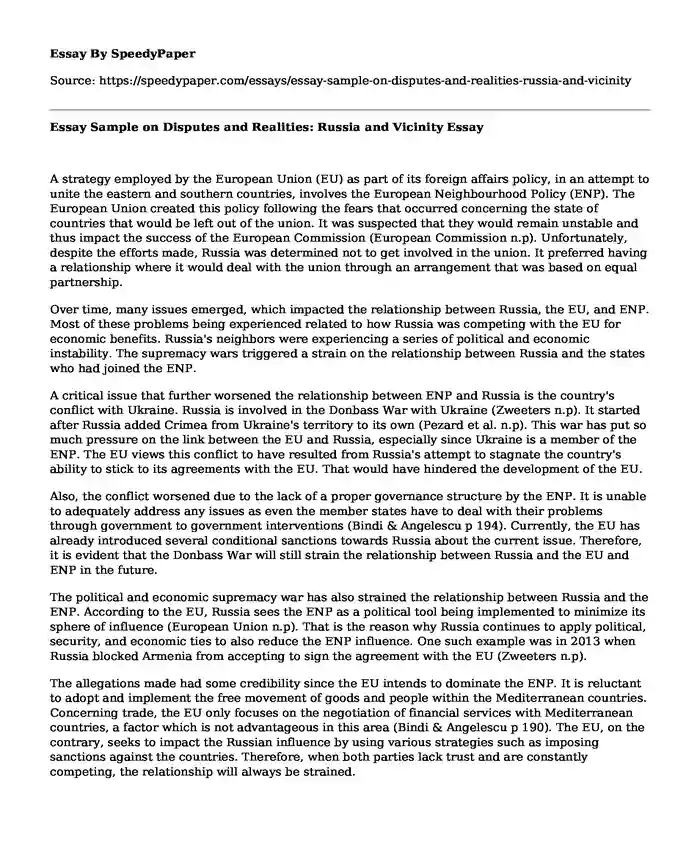
| Type of paper: | Essay |
| Categories: | International relations |
| Pages: | 3 |
| Wordcount: | 717 words |
A strategy employed by the European Union (EU) as part of its foreign affairs policy, in an attempt to unite the eastern and southern countries, involves the European Neighbourhood Policy (ENP). The European Union created this policy following the fears that occurred concerning the state of countries that would be left out of the union. It was suspected that they would remain unstable and thus impact the success of the European Commission (European Commission n.p). Unfortunately, despite the efforts made, Russia was determined not to get involved in the union. It preferred having a relationship where it would deal with the union through an arrangement that was based on equal partnership.
Over time, many issues emerged, which impacted the relationship between Russia, the EU, and ENP. Most of these problems being experienced related to how Russia was competing with the EU for economic benefits. Russia's neighbors were experiencing a series of political and economic instability. The supremacy wars triggered a strain on the relationship between Russia and the states who had joined the ENP.
A critical issue that further worsened the relationship between ENP and Russia is the country's conflict with Ukraine. Russia is involved in the Donbass War with Ukraine (Zweeters n.p). It started after Russia added Crimea from Ukraine's territory to its own (Pezard et al. n.p). This war has put so much pressure on the link between the EU and Russia, especially since Ukraine is a member of the ENP. The EU views this conflict to have resulted from Russia's attempt to stagnate the country's ability to stick to its agreements with the EU. That would have hindered the development of the EU.
Also, the conflict worsened due to the lack of a proper governance structure by the ENP. It is unable to adequately address any issues as even the member states have to deal with their problems through government to government interventions (Bindi & Angelescu p 194). Currently, the EU has already introduced several conditional sanctions towards Russia about the current issue. Therefore, it is evident that the Donbass War will still strain the relationship between Russia and the EU and ENP in the future.
The political and economic supremacy war has also strained the relationship between Russia and the ENP. According to the EU, Russia sees the ENP as a political tool being implemented to minimize its sphere of influence (European Union n.p). That is the reason why Russia continues to apply political, security, and economic ties to also reduce the ENP influence. One such example was in 2013 when Russia blocked Armenia from accepting to sign the agreement with the EU (Zweeters n.p).
The allegations made had some credibility since the EU intends to dominate the ENP. It is reluctant to adopt and implement the free movement of goods and people within the Mediterranean countries. Concerning trade, the EU only focuses on the negotiation of financial services with Mediterranean countries, a factor which is not advantageous in this area (Bindi & Angelescu p 190). The EU, on the contrary, seeks to impact the Russian influence by using various strategies such as imposing sanctions against the countries. Therefore, when both parties lack trust and are constantly competing, the relationship will always be strained.
In conclusion, this relationship between Russia and the ENP is strained as a result of many factors. They include the conflict between Russia and Ukraine, the political and economic supremacy between Russia and the EU, and the lack of a proper governance structure. Therefore, unless these are dealt with effectively, the problem will never be resolved.
Works Cited
Bindi Federiga & Angelescu Irina. The Foreign Policy of the European Union: Assessing Europe's Role in the World (Second Edition). Brookings Institution Press, 2012.
European Commission. European Neighbourhood Policy. Retrieved from https://ec.europa.eu/neighbourhood-enlargement/neighbourhood/overview_en,2018
European Union. EU-Russia Relations: Towards an Increasingly Geopolitical Paradigm. Retrieved from https://eu.boell.org/en/2017/07/03/eu-russia-relations-towards-increasingly-geopolitical-paradigm, 2017.
Pezard Stephanie, Radin Andrew, Szayna Thomas & Larrabee Stephen. European Relations with Russia: Threat Perceptions, Responses, and Strategies in the Wake of the Ukrainian Crisis. Retrieved from https://www.rand.org/content/dam/rand/pubs/research_reports/RR1500/RR1579/RAND_RR1579.pdf, 2017.
Zweeters Wouter. The State of EU relations with Russia and the Eastern Neighbourhood. Retrieved from https://www.clingendael.org/pub/2018/clingendael-state-of-the-union-2018/9-eu-relations-with-russia-and-the-eastern-neighbourhood/, 2018.
Cite this page
Essay Sample on Disputes and Realities: Russia and Vicinity. (2023, Apr 12). Retrieved from https://speedypaper.net/essays/essay-sample-on-disputes-and-realities-russia-and-vicinity
Request Removal
If you are the original author of this essay and no longer wish to have it published on the SpeedyPaper website, please click below to request its removal:
- Free Essay Sample on Why Is Evolution False
- Essay Example with Summary of Relevant Facts on Cultural Conservatism Theory
- Confinement in the Book 'People Could Fly' by Virginia Hamilton
- Essay Sample for Students: Strategic Management of Volkswagen
- Aging Population as a Global Problem, Free Essay with Argument and Solution
- Essay Example: The Obstacles that Affect Interoperability of the Disease Surveillance Systems
- Free Essay Sample: Effects of Channel on Learning
Popular categories




